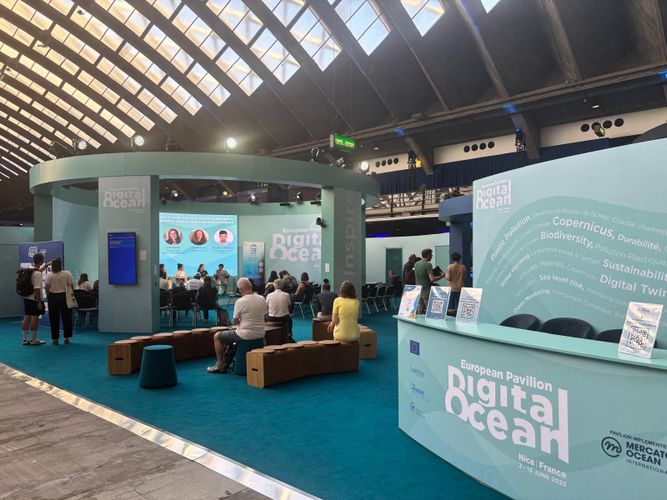SOCIB highlights the role of regional Digital Twins of the Ocean at UNOC3 to promote transformative ocean sciences

The Balearic Islands Coastal Observing and Forecasting System (SOCIB) participated in the One Ocean Science Congress, a United Nations Special Event held in Nice, France, from June 3 to 6, 2025. Organized by CNRS and IFREMER, the congress served as the official scientific foundation of the Third United Nations Ocean Conference (UNOC3), bringing together leading scientists, institutions, and ocean stakeholders to explore innovative, science-based solutions for ocean sustainability. SOCIB contributed actively across various sessions and formats throughout the Congress, showcasing both oral and poster presentations on regional digital twins and coastal resilience.
In the dedicated session “Digital twins of the ocean to explore scenarios, their outcomes and impacts, and support decision,” Joaquín Tintoré, director of the marine research infrastructure SOCIB, presented on behalf of the DITTO Steering Committee and the SOCIB team the talk “Regional Digital Twins of the Ocean: the Opportunity for Effective Integration and Real Transformative Changes Through Fit for Purpose Multi-Platform Ocean Observing and Forecasting, Interoperability and Open Science.” His contribution highlighted the potential of Regional Digital Twins of the Ocean (DTOs) as key tools for advancing more resilient, adaptive, and user-oriented ocean and coastal management. He emphasized that DTOs are more than virtual representations—they are integrated systems that combine real-time observation, advanced modelling, and predictive capabilities to support informed decision-making and explore “what-if” scenarios.
Based on SOCIB’s work in the Balearic Sea, Tintoré presented three illustrative examples of regional digital twin prototypes currently under development. The first focuses on an early warning system for meteotsunamis in Ciutadella Harbour, designed to anticipate and mitigate the impact of sudden sea level oscillations. The second aims to monitor the effects of climate change in the Cabrera Maritime-Terrestrial National Park, providing scientific insights to support conservation and management efforts in this protected area. The third is a predictive model for coastal flooding and erosion, intended to assist in climate adaptation planning by simulating future scenarios and informing decision-making at the local and regional levels.
According to Tintoré, these prototypes demonstrate how digital technologies can be applied to real-world challenges and adapted to specific regional needs. They also reflect SOCIB’s alignment with European and international initiatives such as the EU Digital Twin Ocean (EDITO), DITTO, and CoastPredict, contributing to a shared digital ocean framework. In this context, SOCIB plays an active role in advancing the EDITO initiative. It helps shape its user engagement strategy through the organisation of training sessions and the launch of EDITO’s hackathon at the European Digital Ocean Pavilion during UNOC3, which featured the participation of SOCIB team member Camilo Melo. This involvement brings regional use cases and operational insights from the Balearic Sea into the broader pan-European framework.
SOCIB’s director underscored the need for organizational transformation to fully leverage digital twins, highlighting SOCIB’s shift toward agile practices, participatory design, and enhanced interoperability. “Technology alone doesn’t drive change,” he stated. “We need to design with people in mind, ensuring that the tools we build serve real users and generate real value. In this context, SOCIB positions itself as a regional research infrastructure actively contributing to global conversations on digital transformation and sustainable ocean governance,” Tintoré added. He concluded by invoking the emotional and societal dimension of ocean science. Quoting David Attenborough—“the most important place on Earth is not on land, but at sea”—he urged the international community to engage with the ocean not just through data and models, but also through imagination, empathy, and shared purpose.
Strengthening ocean forecasting and collaboration
Complementing this contribution, SOCIB presented the poster “Towards a regional Digital Twin of the Balearic Sea for sustainable ocean management” by Mélanie Juza et al., showcasing efforts to transform prototype tools into actionable digital infrastructure for regional governance.
Tintoré also participated as co-author in the session “From Science to Shoreline: Bridging Knowledge, Policy, and Action for Coastal Resilience,” contributing to the oral presentation “CoastPredict: Advancing Coastal Resilience through Integrated Observation, Prediction, and Cloud-Based Solutions,” underscoring SOCIB’s commitment to international collaboration.
Further engagements included the session “Establishing Community Interfaces to Optimise Outcomes and Maximise Impacts from Digital Twins of the Ocean,” where Tintoré co-authored a presentation on community engagement and interface design, and the session “Inclusive Science-Policy-Society Interfaces,” in which the SOCIB team led by Emma Reyes presented the poster “FOCCUS: supporting ocean action with improvements to European coastal monitoring and forecasting.”
To close SOCIB’s participation, Tintoré joined the round table of the Mercator Ocean International session “Call for Action to Advance Ocean Prediction Capabilities for the Benefit of Society,” highlighting the need for strategic and collaborative progress in the digital ocean transition. Reflecting this shared vision, Pierre Bahurel, CEO of Mercator Ocean, affirmed: “We are ready for the One Ocean Digital Twin Challenge.”




